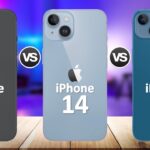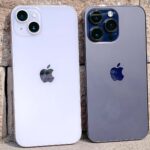The smartphone market is an ever-evolving battlefield, with titans like Apple and Google constantly vying for the top spot. In this digital age, choosing the right smartphone is akin to selecting a life partner—demanding careful consideration and comparison. Enter the iPhone 14 and Google Pixel 7 Pro, two of the most talked-about contenders in recent times. This article aims to dissect these technological marvels, laying bare their strengths and weaknesses, to help you make an informed decision.
Related: Compare iPhone 12 Pro to iPhone 15 Pro
iPhone 14 vs Google Pixel 7 Pro
Trying to decide between the iPhone 14 and Google Pixel 7 Pro? Both phones offer top-of-the-line features but cater to different preferences. This in-depth comparison will help you pick the perfect phone for your needs.
Design and Display
| Feature | iPhone 14 | Pixel 7 Pro |
|---|---|---|
| Display Size | 6.1 inches | 6.7 inches |
| Display Technology | Super Retina XDR (OLED) | LTPO AMOLED |
| Refresh Rate | 60Hz | 120Hz |
| Design | Notch display, Aluminum frame | Punch-hole display, Aluminum frame |
The iPhone 14 and Google Pixel 7 Pro each boast distinctive design philosophies and display technologies that cater to different user preferences. Apple has refined its sleek, minimalist aesthetic with the iPhone 14, featuring Aerospace-grade aluminum and Ceramic Shield front cover for enhanced durability. The Pixel 7 Pro, on the other hand, emphasizes a unique design with a striking camera bar and a tactile finish that sets it apart.
Regarding display quality, both devices impress but in their own ways. The iPhone 14 features a Super Retina XDR OLED display with HDR support, providing incredibly vibrant colors and deep blacks. Google’s Pixel 7 Pro counters have a smooth display that dynamically adjusts up to 120Hz for fluid scrolling and an immersive viewing experience. The choice here depends on whether you prioritize design uniqueness or screen technology.
Camera
| Feature | iPhone 14 | Pixel 7 Pro |
|---|---|---|
| Rear Camera | Dual-lens (48MP main, 12MP ultrawide) | Triple-lens (50MP main, 12MP ultrawide, 48MP 5x telephoto) |
| Front Camera | 12MP | 10.8MP |
| Strengths | Excellent video recording, good low-light performance | Superior zoom capabilities, exceptional computational photography |
The camera systems of the iPhone 14 and Pixel 7 Pro are central to their appeal, boasting advanced photography capabilities. Apple’s device comes equipped with a dual-camera setup that excels in capturing stunning photos in various lighting conditions, supported by Photonic Engine for unprecedented detail. With its Triple rear camera, Google’s offering leverages computational photography to offer versatile shooting options, from astrophotography to Super Res Zoom.
Additional camera features, such as Night Sight on the Pixel 7 Pro and Cinematic mode on the iPhone 14, highlight each brand’s approach to photography. The Pixel excels in low-light photography and offers more creative options for photographers, while the iPhone focuses on video quality and ease of use. Both are exceptional, but your preference may hinge on whether you value still photography or videography more.
Performance and Battery Life
| Feature | iPhone 14 | Pixel 7 Pro |
|---|---|---|
| Processor | A15 Bionic | Google Tensor G2 |
| RAM | 6GB | 8GB |
| Battery Capacity | 3240 mAh | 5000 mAh |
| Battery Life | Up to 24 hours of video playback (claimed) | Up to 24 hours video playback (claimed) |
Performance-wise, both the iPhone 14 and Pixel 7 Pro are powerhouses. The A15 Bionic chip in the iPhone 14 ensures smooth performance across apps and games, complemented by efficiency improvements for better battery life. The Pixel 7 Pro, powered by Google’s Tensor G2 chip, offers smart AI capabilities and multitasking prowess, though with a focus on AI-driven tasks and voice commands.
Battery life is crucial for smartphones, and both devices aim to deliver. The iPhone 14 claims up to 17 hours of video playback, while the Pixel 7 Pro touts impressive endurance, potentially outlasting the iPhone in real-world usage. Fast charging and wireless charging capabilities are standard, but the Pixel 7 Pro edges out with faster wireless charging support.
Software
| Feature | iPhone 14 | Pixel 7 Pro |
|---|---|---|
| Operating System | iOS 16 | Android 13 |
| Updates | Long-term support from Apple | Timely updates directly from Google |
| Customization | Limited | Highly customizable |
The software ecosystem is where these two giants diverge significantly. The iPhone 14 runs on iOS, known for its seamless integration with Apple’s ecosystem, offering a polished and user-friendly experience. The Pixel 7 Pro uses Android 13, offering a more customizable experience and deep integration with Google’s services. Your choice might depend on which ecosystem you’re already invested in or which philosophy you prefer: the curated simplicity of iOS or the customizable openness of Android.
Other Features
| Feature | iPhone 14 | Pixel 7 Pro |
|---|---|---|
| Water Resistance | IP68 | IP68 |
| Face ID | Yes | Yes (under display fingerprint sensor) |
| Wireless Charging | Yes | Yes |
Connectivity options like 5G, Wi-Fi 6E, and Bluetooth 5.2 are standard across both devices, ensuring fast and reliable connections. Unique features such as Face ID on the iPhone and Magic Eraser on the Pixel 7 Pro add value beyond the basics, catering to specific user needs.
Pros & Cons
iPhone 14
- Pros: Excellent performance, long-term software support, and best-in-class video recording.
- Cons: Lower refresh rate display compared to Pixel 7 Pro, less zoom capability, notch display might feel dated.
Pixel 7 Pro
- Pros: Superior zoom capabilities, excellent computational photography, longer battery life (claimed), smoother 120Hz display.
- Cons: Less powerful processor compared to iPhone 14, shorter software support window than iPhones (typically 3 years).
Which Should You Buy?
- For camera enthusiasts: Pixel 7 Pro with its unmatched zoom and computational photography prowess.
- For videographers: The iPhone 14 has its industry-leading video recording capabilities.
- For users prioritizing performance: iPhone 14 with its powerful A15 Bionic chip.
- For those seeking a smoother display, the Pixel 7 Pro with its 120Hz refresh rate.
Who Should Upgrade?
- Upgrading from iPhone 13: Consider upgrading if you desire a significant camera improvement or a higher refresh rate display (Pixel 7 Pro only).
- Upgrading from Pixel 6 Pro: Upgrading might not be necessary unless you crave a significant zoom boost (Pixel 7 Pro only).
Final Thoughts
Both the iPhone 14 and Pixel 7 Pro are excellent flagship smartphones. The best choice depends on your individual priorities. Consider what features matter most to you – camera, performance, battery life, or software – to make an informed decision.
Related: Compare iPhone 13 14 15
iPhone 14 vs Pixel 7 Pro: FAQs
Q: Which phone is faster?
A: The iPhone 14 boasts a slightly faster processor, but real-world performance differences might be negligible.
Q: Which phone has a better camera?
A: It depends! Pixel 7 Pro excels in zoom and computational photography, while iPhone 14 reigns supreme in video recording.
Q: Which phone has a longer battery life?
A: Pixel 7 Pro has a larger battery capacity, but the efficiency of the iPhone 14 might lead to similar usage times.
Q: Does the iPhone 14 have a fingerprint sensor?
A: No, iPhone 14 relies on Face ID for secure unlocking.
Q: How much expandable storage does the Pixel 7 Pro offer?
A: Neither phone offers expandable storage, so choose your storage option wisely.
Q: Is the iPhone 14 worth the upgrade from iPhone 13?
A: Consider upgrading if you crave a better camera or a higher refresh rate display. Otherwise, iPhone 13 remains a solid choice.
Q: I prioritize camera zoom, which phone should I get?
A: Pixel 7 Pro, with its 48MP telephoto lens, offers superior zooming capabilities.
Q: I shoot a lot of videos; which phone is better?
A: The iPhone 14 is the ideal choice with its industry-leading video recording features.
Q: I want a phone with a super smooth display, which one to pick?
A: Pixel 7 Pro’s 120Hz refresh rate offers a smoother experience than iPhone 14’s 60Hz display.




